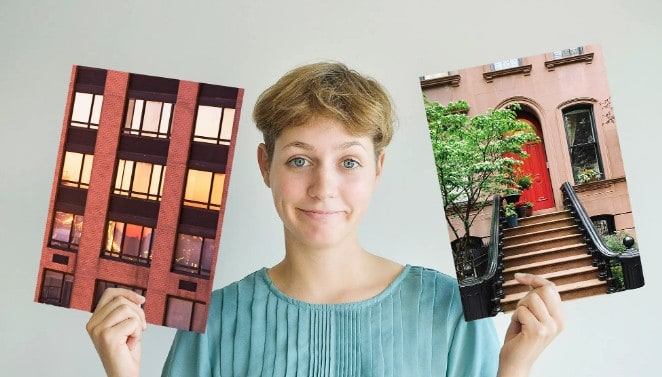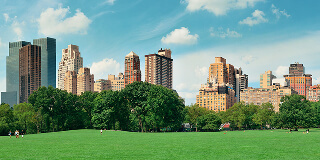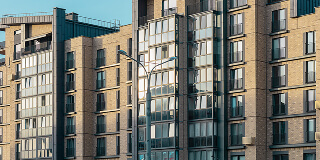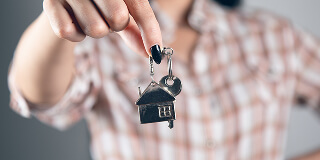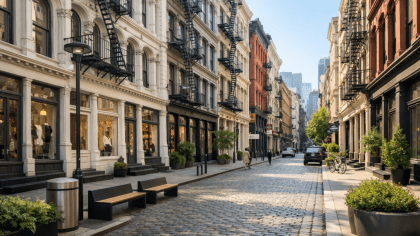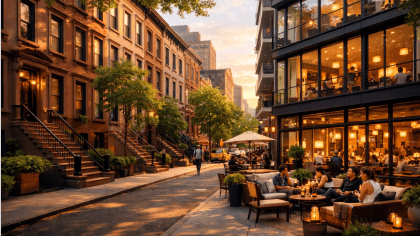When you’re on the hunt for a new place to live, choosing between a townhouse and an apartment can be a big decision.
Each option comes with its own set of perks and drawbacks, and the right choice for you will depend on your lifestyle, budget, and personal preferences.
Let’s dive into the world of townhouses and apartments to help you figure out which one fits you best.
Quick Summary
Choosing between a townhouse and an apartment depends on your lifestyle, budget, and preferences.
Townhouses offer more space and privacy but come with higher costs and maintenance responsibilities.
Apartments provide convenience and amenities, often at a lower cost, but with less privacy and more noise.
Consider your priorities and financial situation to make the best choice for your living situation.
What’s a Townhouse?
A townhouse (or townhome) is like a modern twist on a classic home. Picture a sleek, multi-story pad that shares walls with your neighbors but still gives you your own private entrance.
It’s the perfect blend of city chic and cozy comfort, making it ideal for anyone who wants the best of both worlds.
Why Townhouses Rock:
- Multi-Story Vibes:
- Levels Up: Most townhouses have at least two floors, so you get space to spread out. Imagine having your living room and kitchen on one floor and your bedrooms on another – more room to entertain and relax.
- Urban Loft Feel: The multi-story design gives you that modern, urban loft vibe without needing a whole city block.
- Shared Walls, But Still Private:
- Built-In Community: Sharing walls with your neighbors can be a cool way to feel connected in a tight-knit community. Plus, modern designs and soundproofing ensure you don’t overhear every conversation.
- Less Maintenance: Since you’re sharing walls, the exterior upkeep can be easier. No more shoveling snow from a long driveway or painting a massive house facade!
- Private Entrances:
- Your Own Gateway: With individual front and back doors, you get all the perks of having your own space while still being part of a larger neighborhood. It’s like having a personal entrance to your very own mini-mansion.
- Security and Style: Private entrances also add a touch of style and a sense of security.
- Outdoor Space:
- Chill Zones: Many townhouses come with a small yard, patio, or balcony. Perfect for BBQs, morning coffee, or just chilling out. It’s not a huge yard, but it’s enough for some outdoor fun and relaxation.
- Community Extras: In some townhouse complexes, you get access to shared amenities like parks, pools, or gyms – kind of like having a clubhouse right outside your door.
- Ownership and Renting:
- Flexibility: Whether you’re buying or renting, townhouses offer flexibility. Own it and you’re in charge of your space and any community fees. Renting? It’s low-maintenance living with someone else handling the major upkeep.
- HOA Life: If you own, you might have an HOA (Homeowners’ Association) to manage shared areas and amenities. They’re like the neighborhood managers, keeping everything running smoothly.
Why You’ll Love It:
Townhouses are perfect for young professionals, small families, or anyone who loves modern living with a touch of community.
They offer a stylish, practical, and often more affordable option compared to traditional single-family homes.
Plus, their design makes them a great fit for vibrant urban or suburban settings, keeping you close to the action but with your own slice of personal space.
So, if you’re looking for a place that’s got both the style and substance to match your lifestyle, a townhouse might just be your dream home!
Definition and Characteristics of Apartments
What is an Apartment?
An apartment is a unit within a larger building or complex, typically rented rather than owned.
Apartments come in various sizes and layouts, from studio apartments to multi-bedroom units, and are often located in urban areas or densely populated neighborhoods.
Characteristics of Apartments
- Single-Level Living: Usually on one floor.
- Shared Facilities: Common areas such as hallways, lobbies, and amenities.
- Rental Units: Primarily rented, though some may be condos that are owned.
- Security Features: Often have controlled access and security systems.
- Amenities: Can include gyms, pools, laundry facilities, and more.
Ownership and Rental Differences
Townhouse Ownership vs. Renting
- Ownership: Owning a townhouse is similar to owning a single-family home, where you have full control and responsibility for the property. This includes maintenance, taxes, and any necessary repairs.
- Renting: When renting a townhouse, the landlord typically handles major maintenance and repairs, but you may still be responsible for minor upkeep and yard work.
Apartment Ownership vs. Renting
- Ownership: Owning an apartment (or condo) means you own the interior space, but common areas are shared and maintained by a homeowners’ association (HOA).
- Renting: Apartment lease is straightforward, with the landlord or property management company taking care of maintenance, repairs, and common area upkeep.
Size and Layout Comparison
Townhouse Size and Layout
Townhouses often provide more space than apartments, with multiple floors offering distinct living areas. You’ll typically find:
- Ground Floor: Living room, kitchen, and dining area.
- Upper Floors: Bedrooms and bathrooms.
Apartment Size and Layout
Apartments are usually more compact and may offer a single open-plan space or defined rooms. Common layouts include:
- Studio: One room that serves as the living area and bedroom, with a separate bathroom.
- One-Bedroom: Separate bedroom, living area, kitchen, and bathroom.
- Multi-Bedroom: Additional bedrooms and bathrooms, more defined living spaces.
Amenities and Facilities
Townhouse Amenities
- Private Outdoor Spaces: Small yards, patios, or balconies.
- Garages: Often include attached or detached garages, plus parking.
- Community Features: May include shared pools, parks, or playgrounds.
Apartment Amenities
- Common Areas: Gyms, pools, lounges, and laundry facilities.
- Security: Controlled access, security cameras, and sometimes doormen.
- Convenience: Proximity to public transportation, shops, and restaurants.
Privacy and Noise Considerations
Townhouse Privacy and Noise
Townhouses generally offer more privacy than apartments, with fewer shared walls and private entrances.
However, you may still hear noise from adjacent units, especially in densely packed complexes.
Apartment Privacy and Noise
Apartments can vary widely in terms of privacy and noise levels. Higher-end buildings may offer better soundproofing, but you’ll still share walls, floors, and ceilings with neighbors, which can lead to noise issues.
Maintenance Responsibilities
Townhouse Maintenance
- Owners: Responsible for both interior and exterior maintenance, including yard work, repairs, and upkeep.
- Renters: Typically handle minor interior maintenance, while landlords cover major repairs and exterior upkeep.
Apartment Maintenance
- Owners (Condos): Responsible for interior maintenance, while the HOA handles exterior and common area upkeep.
- Renters: Landlords or property management companies are responsible for maintenance and repairs.
Cost Analysis: Purchase vs Renting
Cost of Buying a Townhouse
- Purchase Price: Generally higher than an apartment but lower than a single-family home.
- Maintenance Costs: Owners cover all maintenance and repair costs.
- Property Taxes and HOA Fees: Ongoing expenses to consider.
Cost of Renting a Townhouse
- Rent: Typically higher than an apartment due to larger space and amenities.
- Utilities and Maintenance: Renters may pay for utilities and minor maintenance.
Cost of Buying an Apartment (Condo)
- Purchase Price: Can vary widely depending on location and building amenities.
- HOA Fees: Monthly fees for maintenance of common areas and facilities.
- Property Taxes: Typically lower than a townhouse or single-family home.
Cost of Renting an Apartment
- Rent: Often more affordable than renting a townhouse.
- Utilities: Renters may pay for utilities, but maintenance is usually covered.
Community and Neighborhood Factors
Townhouse Communities
- Suburban Settings: Often located in suburban areas with more space and greenery.
- Family-Friendly: Popular with families due to larger living spaces and outdoor areas.
- Community Feel: Close-knit communities with shared amenities.
Apartment Neighborhoods
- Urban Locations: Typically found in city centers or densely populated areas.
- Convenience: Close to public transportation, shops, restaurants, and entertainment.
- Diverse Communities: Attract a wide range of residents, from young professionals to retirees.
Pros and Cons of Townhouse Living
Pros of Townhouse Living
- Space: More living space compared to most apartments.
- Privacy: Private entrances and fewer shared walls.
- Ownership: Opportunity to own property without the full responsibility of a single-family home.
Cons of Townhouse Living
- Maintenance: More maintenance responsibilities compared to an apartment.
- Cost: Higher purchase and rental costs.
- Location: Often located in suburban areas, which may require commuting.


